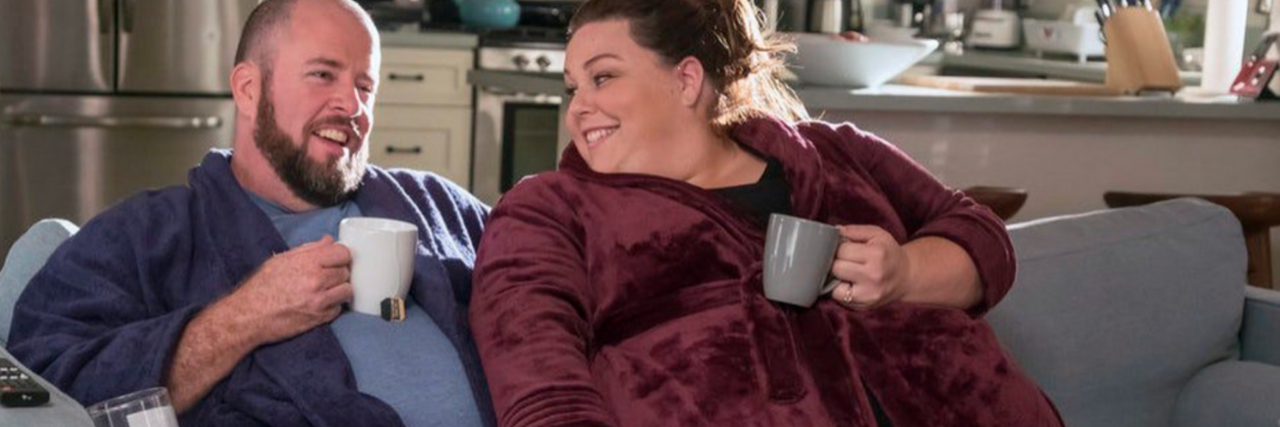'This Is Us’ Shows How Doctors Can Miss the Big Picture When They Focus on Weight
Sometimes the news isn’t as straightforward as it’s made to seem. Elizabeth Cassidy, The Mighty’s news reporter, explains what to keep in mind if you see this topic or similar stories in your newsfeed. This is The Mighty Takeaway.
Editor's Note
This post is about the first episode of season three of “This Is Us” and contains spoilers.
The “This Is Us” premiere tackled a health issue 1 in 10 women live with. The show revealed Kate Pearson (Chrissy Metz) has polycystic ovary syndrome (PCOS) after she and Toby take a trip to the doctor for infertility.
Watching Kate’s storyline with PCOS was both relatable and uncomfortable for me. I was diagnosed with PCOS when I was 15, a relatively young age since most are diagnosed during their childbearing years. As someone with PCOS who has had less than ideal interactions with doctors, I worry about the way “This Is Us” handled Kate’s PCOS diagnosis. Even though the portrayal was realistic, promoting the idea that losing weight will solve all of Kate’s problems is a dangerous narrative to spread.
Kate wasn’t diagnosed until her late thirties, but a few interactions with her doctors in the episode led me to believe there are specific doctor interactions many women with PCOS have, regardless of age.
For instance, the doctor flippantly gives Kate her diagnosis as if she’s telling a waiter what she wants for dinner. There’s no explanation as to what PCOS entails other than it’s probably related to her weight and infertility issues.
Instead of explaining how PCOS is a hormonal imbalance, it’s skipped over and just mentioned as the reason she has infertility issues. The doctor also mentions her weight as something linked to PCOS.
When I heard the doctor skip over Kate’s diagnosis, I was angered, but I wasn’t shocked. You could see Kate’s face as she tried to process the diagnosis for a split second before her doctor went on to talk about weight and infertility. Of course, those topics are important to discuss in relation to PCOS, but there needs to be disease education as well.
For instance, I was told PCOS could give me prediabetes, but I wasn’t told how. I was led to believe it was only my weight that would cause this, not the fact that the condition itself is linked to insulin resistance.
Here’s what the doctor should have told Kate: PCOS is a hormonal imbalance with a wide range of symptoms and effects. These can include irregular periods, excess androgen (male hormones all women have), and cysts on the ovaries (though many women with PCOS don’t have them). These factors can make it difficult to get pregnant and carry to term. Other complications include prediabetes or type 2 diabetes, high blood pressure and heart disease. You may notice other symptoms like weight gain, which is harder to lose, acne, unusual hair growth in places like the face and stomach and thinning hair. Ideally, this information would be spread out and handled empathetically.
Kate was told her entire life that she was overweight, needed to watch what she was eating and needed to be more active. She tried all of that but still struggled to lose weight. You can tell she was frustrated that, though she was doing everything right, she still wasn’t losing weight. We do learn that Kate has lost substantial weight in this episode, though.
For a lot of women, weight loss is the first thing doctors recommend for reducing PCOS symptoms. While weight loss can help with symptoms, it’s almost marketed as a “cure” when it isn’t.
Some women with PCOS have no issues becoming pregnant, some have issues at first, but as they get older, it becomes easier to get pregnant. Others aren’t able to have kids at all. Miscarriage rates are also higher in women with PCOS, which was a part of Kate’s storyline last season.
Later in the episode, an IVF specialist tells Kate she won’t take her on as a patient because of her weight. She says it would be a “liability” to put her under anesthesia at her weight, and the IVF success rate is much lower for women who are overweight. Kate says she’s willing to take the chance, but the doctor insists that it isn’t an option.
The doctor could have explained the risks with anesthesia without calling her a liability, which was uncalled for and shows the doctor’s true colors. She’s more worried about being sued than the potential health risks to Kate.
While it is true that people who are overweight are at an increased risk of complications from anesthesia, including death, doctors need to be more empathetic, especially when it comes to topics like infertility.
Fortunately for Kate, her luck changes when the IVF specialist calls her back later in the episode and tells her she’ll take her on as a patient.
As the season goes forward, I hope there is more talk about PCOS. If Kate has a hard time with IVF, I’m worried the show will only focus on Kate’s weight as a reason she struggles to get pregnant. There needs to be a conversation about how PCOS could affect Kate’s chances separately from her weight.
Photo via Twitter

